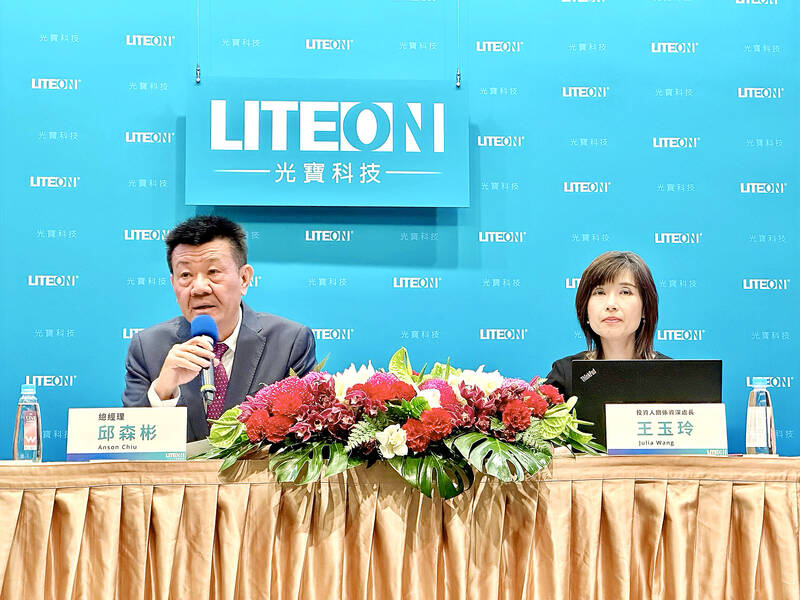Electronic components supplier Lite-On Technology Corp (光寶科技) yesterday reported weaker-than-expected earnings per share (EPS) of NT$1.51 for last year’s October-to-December quarter due to declining sales and slowing gross margin improvement.
However, last year’s total EPS was the highest in the company’s history at NT$6.36, compared with NT$6.19 the previous year, as gross margin hit a record high of 22 percent despite a retreat in annual sales.
As a result, the company’s board of directors approved a plan to distribute a cash dividend of NT$2.5 per share for the fourth quarter of last year, the company said.

Photo: Fang Wei-chieh, Taipei Times
Including a cash dividend of NT$2 per share it distributed for the first half of last year, Lite-On’s total cash dividends for last year would reach NT$4.5 per share with a 70.75 percent payout ratio if the company receives a green light from shareholders at its annual general meeting on May 27, it said.
This quarter, the company’s sales would drop sequentially due to clients’ inventory adjustments dragging down its information technology and consumer electronics business, Lite-On president Anson Chiu (邱森彬) said at the conference.
The information technology and consumer electronics segment contributed 46 percent of the company’s sales of NT$36.91 billion (US$1.17 billion) last quarter, ahead of the cloud computing and artificial intelligence (AI) of things segment’s 35 percent and the optoelectronics segment’s 19 percent, the document showed.
The company expects business to resume growth from the second quarter, driven by contributions from sales of opto-semiconductors, automotive electronics and power supplies for AI servers, Chiu said.
Lite-On is targeted to achieve double-digit percentage growth in annual sales for the next three years beginning this year, he added.
The company is paying growing attention to AI applications with larger exposure to server power solutions, keyboards and handset opto-semiconductors this year, Chiu said.
Contributions from those AI-related products are expected to account for 7 to 8 percent of the company’s sales this year and reach double-digit figures next year, compared with nearly 5 percent last year, he said.
The company’s reported earnings showed it posted a fourth-quarter net profit of NT$3.46 billion, down 24 percent from the previous quarter and also down 10 percent from the previous year, as sales in the quarter decreased 8 percent sequentially and 14 percent annually to NT$36.91 billion.
Yuanta Securities Investment Consulting Co (元大投顧) had expected the company to post fourth-quarter sales of NT$40.92 billion, with net profit of NT$4.38 billion, or EPS of NT$1.91.
That brought last year’s total net profit to NT$14.57 billion, up 3 percent from 2022, while full-year sales fell 14 percent annually to NT$148.33 billion, Lite-On said.

MULTIFACETED: A task force has analyzed possible scenarios and created responses to assist domestic industries in dealing with US tariffs, the economics minister said The Executive Yuan is tomorrow to announce countermeasures to US President Donald Trump’s planned reciprocal tariffs, although the details of the plan would not be made public until Monday next week, Minister of Economic Affairs J.W. Kuo (郭智輝) said yesterday. The Cabinet established an economic and trade task force in November last year to deal with US trade and tariff related issues, Kuo told reporters outside the legislature in Taipei. The task force has been analyzing and evaluating all kinds of scenarios to identify suitable responses and determine how best to assist domestic industries in managing the effects of Trump’s tariffs, he

TIGHT-LIPPED: UMC said it had no merger plans at the moment, after Nikkei Asia reported that the firm and GlobalFoundries were considering restarting merger talks United Microelectronics Corp (UMC, 聯電), the world’s No. 4 contract chipmaker, yesterday launched a new US$5 billion 12-inch chip factory in Singapore as part of its latest effort to diversify its manufacturing footprint amid growing geopolitical risks. The new factory, adjacent to UMC’s existing Singapore fab in the Pasir Res Wafer Fab Park, is scheduled to enter volume production next year, utilizing mature 22-nanometer and 28-nanometer process technologies, UMC said in a statement. The company plans to invest US$5 billion during the first phase of the new fab, which would have an installed capacity of 30,000 12-inch wafers per month, it said. The

Taiwan’s official purchasing managers’ index (PMI) last month rose 0.2 percentage points to 54.2, in a second consecutive month of expansion, thanks to front-loading demand intended to avoid potential US tariff hikes, the Chung-Hua Institution for Economic Research (CIER, 中華經濟研究院) said yesterday. While short-term demand appeared robust, uncertainties rose due to US President Donald Trump’s unpredictable trade policy, CIER president Lien Hsien-ming (連賢明) told a news conference in Taipei. Taiwan’s economy this year would be characterized by high-level fluctuations and the volatility would be wilder than most expect, Lien said Demand for electronics, particularly semiconductors, continues to benefit from US technology giants’ effort

‘SWASTICAR’: Tesla CEO Elon Musk’s close association with Donald Trump has prompted opponents to brand him a ‘Nazi’ and resulted in a dramatic drop in sales Demonstrators descended on Tesla Inc dealerships across the US, and in Europe and Canada on Saturday to protest company chief Elon Musk, who has amassed extraordinary power as a top adviser to US President Donald Trump. Waving signs with messages such as “Musk is stealing our money” and “Reclaim our country,” the protests largely took place peacefully following fiery episodes of vandalism on Tesla vehicles, dealerships and other facilities in recent weeks that US officials have denounced as terrorism. Hundreds rallied on Saturday outside the Tesla dealership in Manhattan. Some blasted Musk, the world’s richest man, while others demanded the shuttering of his